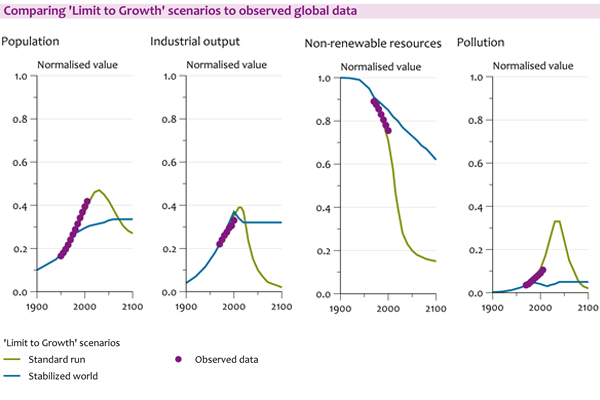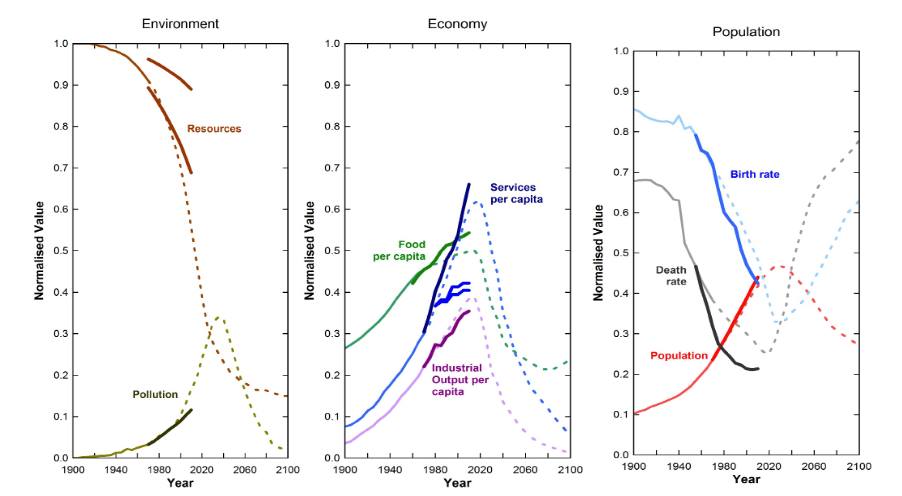|
As I've said elsewhere, at this point it's pretty clear that we are going to experience a crash/collapse of "the way things are." Industrial civilization is crashing into limits. Once even slightly convinced, most people wonder what this means to our future on this planet. How will this play out? What does this mean? How will our lives change? This post aims to answer these questions in depth. There are a few ideas that are foundational to understanding all this. The first is the most basic: 1.) Present trends will not continue into the future. 2.) We will see shortages, of both goods (things you buy) and services (including maintenance/repair work, as well as public systems like transport, communications, or utilities such as electricity and water). 3.) Ever-increasing (and unending) scarcity and downscaling. 4.) Number 3 inevitably leads, on a global scale, to increased military conflicts. 5.) Negative features threaten to become steadily worse. "Scarcity" will be the buzzword of the future. My judgmeent is that there is no way of preventing massive suffering. There was, 4-5 decades ago. But no one listened back then to the warnings. Even according to some optimistic studies we had a chance back in the early 2000's to do so, but failed to implement anything. See my post here where the experts said there needs to be at least twenty years notice and a serious coordinated effort to the tune of trillions of dollars to avoid disastrous results, which needed to be enacted back in 2005 at the latest. I want to talk very briefly about a few Mega Trends that will guide our path downward and then move on to talking about collapse in depth and how our future will play out. The overarching premise here is that the future will be shaped by scarcity rather than abundance. This is the opposite of how we've lived all our lives so far. There are three mega-trends that are in play: 1.) Energy. Most people believe in permanent abundance. The common understanding nowadays is that we will smoothly transition away from fossil fuels (not because we are having a difficult time getting enough out economically, but because we need to for the sake of the environment, or so the mainstream thinking goes) to "renewable" forms of energy on a massive scale. I will do another post on how renewables won't save us. For now all I will say is that at the same time peak-cheap-oil is starving the world's economic engine for the growth its money systems demand of it, someday (likely very soon) world oil production will peak and terminally decline. 2.) Debt. Again, most people seem to believe that debt doesn't matter. All efforts to cram the world full of fresh new debt lending are going to end in failure because the requisite net energy is simply no longer there to support continued debt accumulations running several-fold faster than actual economic productive output. 3.) Environment. We are in the midst of a 6th mass extinction event. Oceans are acidifying at the fastest rate in 300 million years. The stable weather patterns we depend on to grow our foods are becoming increasingly chaotic and unreliable. We are driving up to 200 species to extinction per day. All salt water (ocean) fish could be extinct by 2048. Please see my other post: Historical Perspective for more. So then, what will the future look like? First I will define: "what do we mean by collapse?" and then I will lay out what the future will look like in more depth. I think about "collapse" as having categories. There's: 1) Black Swan Events. These are the kinds of things that would cause complete anarchy overnight. Examples would be nuclear EMP, all-out nuclear war, alien invasion, etc. 2) Total collapse. All major public services cease. A true WROL (Without Rule of Law, meaning no one out there to help you or to call if you get in trouble - no police or military coming to your aid) scenario for the vast majority of the nation. This could occur fairly quickly (within a month) of something like a significant oil price shock, a total banking failure (a la 2008 without the bailout), or a total market meltdown (from other major countries such as Russia and China officially switching away from using the Dollar as the world reserve currency, perhaps - which is certainly going to happen within the next decade; the question is if it will be fast and unexpected or if the US will cooperate and slowly transition.) 3) Major Collapse. Most major public services cease, but only in one geographic area at a time. At least at first. The dominoes will eventually topple and it will affect everyone everywhere. This is the most likely scenario, and it will play out over the course of approximately the next decade. Examples would be failing infrastructure (and/or hacking/cyber warfare) and/or the electric grid going down on the entire Eastern seaboard of the US (or other area), as well as things like high-impact weather events like Hurricane Katrina showed us could happen, or unending wildfires in the Southeast (like what we're seeing now, only much worse), or in California, driving food prices way up until most people couldn't afford to eat. 4) Breakdown. This will certainly be local, and is certainly already occurring in many places in the US and around the world. Personally, from all I've read, I believe that Major Collapse is the most likely scenario. This will occur (and is already occurring), with greater and more shocks to the system, over the next decade. By 2025, this nation will not look at all the same and the former optimists will be wailing and gnashing their teeth. This will precipitate a Total Collapse scenario at around 2025-2030. Source: The source for the above graphic is the following linked research paper, on page 23. The link may take a minute to load in your browser window. http://www.rivm.nl/bibliotheek/rapporten/500201001.pdf Source: The source for the above graphic is the following linked research paper. The link may take a minute to load in your browser window. http://sustainable.unimelb.edu.au/sites/default/files/docs/MSSI-ResearchPaper-4_Turner_2014.pdf The decline of globalized industrial civilization will lead to a collapse of the global economy. We are at the cusp of rapid and severely disruptive changes. This will evolve as a systemic crisis. The infrastructure of our civilization will break down, giving rise to a predicament that will swamp government's ability to manage. It will lead to widespread disorientation, anxiety, and social breakdown. Appeals to localism, "transition movements," organic food, and renewable energy are laudable and necessary, but are totally out of scale to what is coming. There is no solution, though there are some paths which are better and wiser than others. What we need is rapid emergency planning coupled with a plan for longer-term adaptation. The crisis' will force societies, towns, and neighborhoods to recreate themselves based on their respective needs, culture, resources, and government responses. The impacts will not be the same equally for everyone everywhere at any given time. Local and societal responses and adaptation strategies will vary and be influenced by factors including: geography, environment, access to resources, economics, markets, culture, religion, and politics. There are no solutions that do not involve major changes in lifestyle. The sooner people and societies prepare for a post-peak-oil life, the more they will be able to influence the direction of their opportunities. The effects of global collapse will be varied - they will not be consistent everywhere. Each region, nation, and community will be affected based on a multitude of circumstances. Therefore, adaptation strategies will vary according to circumstances and the environment. Those societies with access to energy resources may be able to maintain some semblance of modern industry and civilization, for a time. Most people though will have to live in pre-industrial conditions, with some relics of the industrial age to various extents. Most communities will have to develop localized economies and food production. Globally, the collapse of globalization and the economy will cause mass displacement and migration. Societies with access to resources will become targets of resource wars for energy, food, water, and material resources. Economic and social collapse will cause political instability, revolutions, failed states, social unrest (riots and civil wars), increased crime, military action, and other conflicts. Conclusion: The best vision of the future will depend greatly on your geographic area, your personal resiliency, and your town/city's resiliency. The breakdowns will be local, and where you live affects what kind of breakdowns you will have to deal with and the severity with which they affect you and your neighborhood.
At this point, the obvious next step is to wonder how a person can prepare for such a future. Tune in to my next post, which will be about just that - preparing to face the end of industrial civilization.
4 Comments
Janet Potte
11/26/2016 09:15:14 am
Reply
Philip Gaut
1/29/2017 08:06:23 am
Excellent! I've stumbled upon your blog entirely by accident, and just want to say that I agree almost completely with your analysis. Where I differ from you (whoever and wherever you may be) is that I think collapse has already started and will spread more rapidly than you predict. We'll see soon enough.
Reply
Nancy
5/15/2018 02:49:51 pm
Brilliant! Love having you as a FB friend, and now this! Have to sign up here
Reply
11/30/2020 12:45:58 pm
Is this the research paper? https://portals.iucn.org/library/sites/library/files/documents/Man-Dev-141.pdf
Reply
Leave a Reply. |
The future is going to be far different than the past. The next decade is going to look vastly different than the last decade. This blog is about the transition.
If you like what you see, contribute to making this blog a success here:
Recent Posts: Physical Preps and Tools Prepping Priorities - Physical & Psychological 2022 US Threat Assessment Part II 2022 US Threat Assessment Part I GONE Bag: Get Out Now Emergency Tactical Gear Considerations Interview with Derrick Jensen 2020: A Marker For Collapse Firearms And Our Future Thermodynamic Failure: Phase 2 Firearms and Defense Syria 1971 Explaining Peak Oil Graduate-Level Preparedness The Significance of Renewables Preparing What Will The Future Look Like? What Do The Experts Say? Hope is Complex and Fragile Historical Perspective Personal Change Does Not Equal Social Change Why Genesis 1:28 Doesn't Apply It's Not About Running Out of Oil Introduction |


 RSS Feed
RSS Feed
